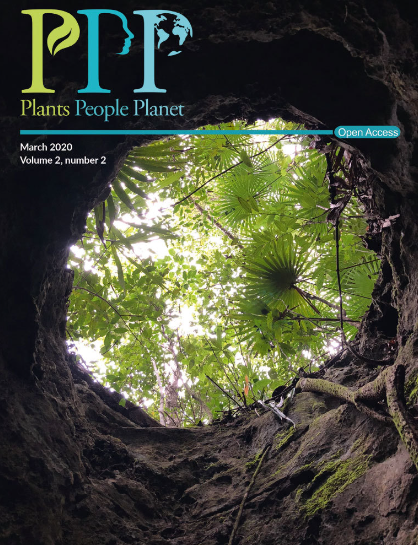家庭和社区花园的环境园艺——一种综合和应用的研究方法
IF 3.6
2区 环境科学与生态学
Q1 BIODIVERSITY CONSERVATION
引用次数: 0
摘要
气候变化和生物多样性丧失等令人生畏的全球挑战似乎势不可挡。然而,园丁有一个秘密武器——花园、阳台、室内种植、庭院和分配是微型生态系统,通过利用这些空间“尽我们所能,用我们所拥有的,在我们所处的地方”,提供机会来对抗无助、不足和由此产生的无所作为的看法。尽量减少园艺“足迹”以减轻有害影响,同时尽量增加园艺“手印”以增加效益,这是很容易实现的。考虑到这一点,皇家园艺学会正在领导对花园环境园艺的研究,以及对个人健康的好处。这篇文章提出了一个综合的和应用的研究方法,以独特的和多学科的科学领域,这里被称为环境园艺。它通过:(a)为这一特定领域的研究方法提供一个机构视角(皇家园艺学会),强调为什么家庭和社区花园在全球环境威胁的背景下很重要;(b)提出四个主要研究重点领域和项目实例;(c)强调跨学科联系、未来研究需求、公众参与/知识共享机会以及环境园艺领域的“绿色技能”发展。讨论的研究重点领域是:(1)应对气候变化(花园的适应、减缓和复原力解决方案);(2)“目的植物”(利用园艺植物多样性和园艺的潜力,帮助调节环境条件);(3)通过有效和高效的资源管理(减量化、再利用、再循环和再利用)来降低可持续性和气候风险;(4)为人类健康和福祉选择园艺和栽培植物。我们认为,一个关键的研究重点是提高我们对土壤、水、植物、天气和人之间的联系和相互作用的理解。这些关键的联系影响着室外和室内植物的地上和地下过程。它们影响着水和养分循环的有效性,生态系统服务的提供程度,以及由此产生的园林和园艺提供环境和人类健康惠益的能力。本文章由计算机程序翻译,如有差异,请以英文原文为准。
Environmental horticulture for domestic and community gardens—An integrated and applied research approach
Societal Impact Statement Daunting global challenges of climate change and biodiversity loss may seem overwhelming. However, gardeners have a secret weapon—gardens, balconies, indoor planting, yards and allotments are mini‐ecosystems that offer opportunities to counter perceptions of helplessness, inadequacy and resultant inaction by using those spaces to ‘Do what we can, with what we have, where we are’. Minimising gardening ‘footprints’ to mitigate harmful impacts, whilst maximising gardening ‘handprints’ to enhance benefits, is readily achievable. With this in mind, the Royal Horticultural Society is leading research into environmental horticulture for gardens, and benefits for individual wellbeing. Summary This article presents an integrated and applied research approach to the unique and multi‐disciplinary area of science referred to here as environmental horticulture. It does this by: (a) providing an institutional perspective (The Royal Horticultural Society) on a research approach for this particular area, emphasising why domestic and community gardens are important in the context of global environmental threats; (b) presenting four primary research focus areas and project examples; and (c) highlighting interdisciplinary linkages, future research needs, public engagement/knowledge sharing opportunities, and ‘Green Skills’ development in the area of environmental horticulture. Research focus areas discussed are: (1) responding to the changing climate (adaptation, mitigation and resilience solutions in gardens); (2) ‘plants for purpose’ (harnessing the potential of horticultural plant diversity, and gardening, to help regulate environmental conditions); (3) sustainability and climate risk reduction through effective and efficient resource management (reduction, re‐use, recycling and repurposing); and (4) gardening and cultivated plant choice for human health and wellbeing. We argue that a key research priority is improving our understanding of the linkages and interactions between soil, water, plants, weather and people. These crucial linkages affect above and below ground processes, for both outdoor and indoor plants. They impact the effectiveness with which water and nutrient cycling takes place, the extent to which ecosystem services may be delivered, and the resultant capacity of gardens and gardening to provide environmental and human health benefits.
求助全文
通过发布文献求助,成功后即可免费获取论文全文。
去求助
来源期刊

Plants People Planet
Multiple-
CiteScore
9.90
自引率
5.90%
发文量
81
审稿时长
12 weeks
期刊介绍:
Plants, People, Planet aims to publish outstanding research across the plant sciences, placing it firmly within the context of its wider relevance to people, society and the planet. We encourage scientists to consider carefully the potential impact of their research on people’s daily lives, on society, and on the world in which we live. We welcome submissions from all areas of plant sciences, from ecosystem studies to molecular genetics, and particularly encourage interdisciplinary studies, for instance within the social and medical sciences and chemistry and engineering.
 求助内容:
求助内容: 应助结果提醒方式:
应助结果提醒方式:


